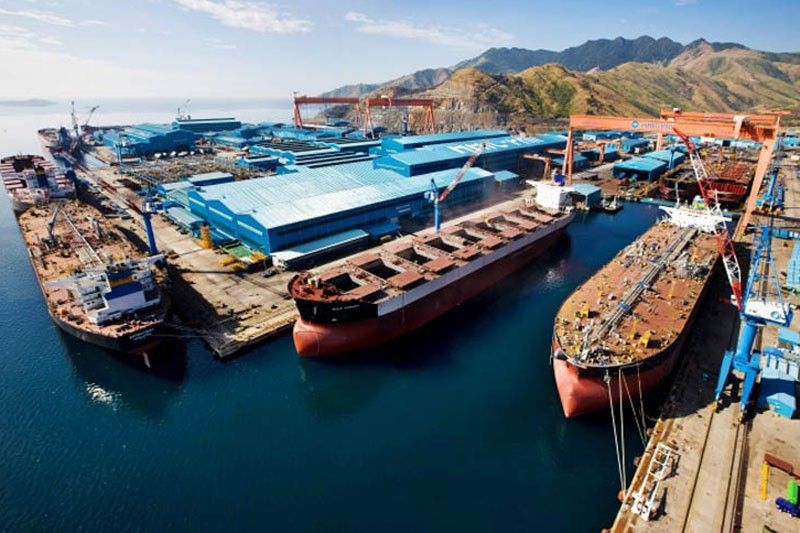Hanjin mess unlikely to shake Philippine banks — Fitch unit

MANILA, Philippines — The failure of troubled Korean shipbuilder Hanjin Heavy Industries and Construction Philippines (HHIC-Phil) to settle its obligations to five of the largest banks in the Philippines worth over P21 billion is unlikely to rock the country’s stable banking system, a unit of Fitch Group said yesterday.
In its latest industry analysis, Fitch Solutions Macro Research said the loan default by HHIC-Phil is not a systemic problem and is unlikely to threaten financial stability in the country in the near-term.
“We expect little fallout for the banking system as a whole from the default due to three reasons. Firstly, there is little concentration risk,” it said.
Fitch Solutions pointed out there is low concentration risk, while Philippine banks in general boast healthy capital buffers and low non-performing loans.
“That said, we expect the operating environment to become more challenging over the coming quarters, which will mildly erode the strength and financial buffers of Philippine banks across the board,” it added.
The research arm said Philippine banks, as a whole, have strong capital buffers and low non-performing loans on their balance sheets.
“Nevertheless, we maintain our expectation for credit growth to slow and asset quality to weaken over the coming quarters, as the operating environment becomes more challenging due to slowing economic growth momentum and tightening monetary conditions,” it said.
The country’s largest banks led by BDO Unibank of retail and banking magnate Henry Sy, Metropolitan Bank & Trust Co. (Metrobank) founded by the late taipan George SK Ty, state-run Land Bank of the Philippines, Ayala-led Bank of the Philippine Islands (BPI), and Yuchengco-owned Rizal Commercial Banking Corp. (RCBC) have a combined exposure of a little over P21 billion to HHIC-Phil.
BDO is the country’s largest bank in terms of assets with P2.79 trillion, followed by Metrobank with P1.79 trillion, Landbank with P1.77 trillion, BPI with P1.7 trillion, while RCBC is the 10th largest with P500.84 billion.
BSP Deputy Governor Diwa Guinigundo earlier said the debt of HHIC-Phil only accounts for 0.24 percent of the total gross loans of the Philippine banking system, and 2.48 percent of foreign currency loans.
Fitch Solutions said all five banks have reportedly come together to take control of the assets of HHIC-Phil in the Philippines, and agreed that no single lender would unilaterally seize the company’s assets.
Lastly, it added the Philippine banking system as a whole boasts robust capital and liquidity buffers, while asset quality remains healthy, with the non-performing loans ratio well-below crisis levels. Indeed, gross NPLs as a share of total loans came in at 1.85 percent in November 2018, roughly stable over the past 12 months.
Likewise, it said the NPL coverage ratio of 108.25 percent indicates adequate loan-loss provisioning.
The capital adequacy ratio for the sector also stood at 15.36 percent in September 2018, far exceeding the regulatory requirement of 10 percent.
Meanwhile, the listed Philippine banks said in separate disclosures to the Philippine Stock Exchange (PSE) their exposure of HHIC-Phil.
For one, RCBC corporate planning head and corporate information officer Ma. Christina Alvarez said the bank’s $145 million exposure to the ailing shipbuilder is covered by four shipbuilding contracts
“We confirm that RCBC has an exposure to HHIC-Phils amounting to $145M, with four shipbuilding contracts, the completion of which will allow the repayment of the loan. The local banks have a Parent Guaranty from Hanjin Korea, which secures the exposure to HHIC Phils,” Alvarez said.
She added the total exposure is only one percent of RCBC’s assets of P614 billion and less than two percent of the bank’s loan book of P387 billion.
“The bank’s balance sheet, with capital of P84 billion as of September 2018, is in a strong position to absorb these provisions. Even with this default, the bank’s capital adequacy ratio of 17.3 percent remains very strong, well-above regulatory minimum and can still support medium term loan growth,” she said.
On the other hand, Metrobank said its exposure is low relative to the listed bank’s total assets of P2.1 trillion.
“We have adequate provisions and we do not see any significant impact to our operations,” Metrobank added.
BDO, the country’s largest lender, said the bank does not expect the exposure to have a material effect on its business, operations and/or financial condition as it represents only 0.15 percent of total loan portfolio.
“Such is not considered a material amount,” BDO said in a separate disclosure.
BPI said its $52 million working capital loan with continuing suretyship of HHIC-Korea is approximately 0.20 percent of its total loan book.
“We have partially provisioned for this and additional provisions in 2019 is manageable,” BPI said.
- Latest
- Trending






























